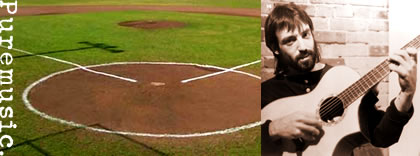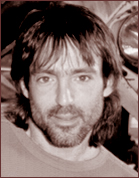
A Conversation with Chuck Brodsky (continued)
CB: But it was great, Mike actually took me around and gave me a little tour of the set and stuff. It was a really special day for me, because he gave me such personal attention, and he let me see some scenes that had been shot that they were just getting back from development. He kind of walked me around the set personally, and it was a thrill.
PM: And what a unique story and a unique experience in the life of a great story songwriter. I mean, talk about an interactive history of a song.
CB: Really.
PM: So might this Radio break bring any changes along with it? I mean, it's probably not going to hurt bookings any.
CB: No, I don't think it's going to hurt in any way, but I'm not banking on things to change dramatically. I'm a realist.
PM: Yeah.
CB: And maybe I'll get some exposure from it, maybe I'll get a break or two. Maybe the film industry will give me a little credibility if I were to try to pitch another song or two to some other film that might be potentially made about something I've written about or could write about. You never know.
PM: Because you're so good at writing stories and writing characters, I mean, I certainly could see--and I know a lot of your fans could see--your songs and your style forming a soundtrack to a movie, especially if it was very character driven.
PM: I'd love to see something like that happen. But I don't have a lot of faith in Hollywood, and I don't have a lot of faith in the big entertainment industry, that they'll look at somebody like me.
To tell you the truth, they packed this movie full of songs from the 70s, because the 70s is the period they focused on in Radio's life. So they packed the movie full of all sorts of songs that were ultimately irrelevant to the story.
PM: Naturally.
CB: And they had my song, but they actually hired somebody else--some hotshot Hollywood music person--to write a new song about Radio that I'm sure is, well, not so good. But they had a song in their hands that told the whole story, and they only use a small piece of it in the end, the very end of the credits. And I don't mean to be sounding like I'm crying sour grapes, but I just think it's stupid. I think they had what they needed already, and people that I know who have seen the film told me that the music was pretty awful. And knowing how much they paid people like Stevie Wonder and Al Jarreau versus what they paid little folksinger Chuck for my song, it just kind of reinforces what I already knew about the big entertainment industry.
PM: Right.
CB: Which goes a long way towards explaining why, in the first place, I became a folksinger, because I just wanted my life to be clean from all that kind of stuff. And I don't like dealing with that approach that folk music, thank God, doesn't do.
But the truth is that I'm thrilled to have my song included in the movie. It means a lot to me because Radio and Coach are personal friends. The very idea of a major movie being made about some friends--imagine a movie is made about two of your friends.
PM: Yeah.
CB: It's mind boggling.
PM: It's unthinkable.
CB: And so it's a very personal thing to have been included, regardless of what they paid me, regardless of how much of the song they use or don't use, just to know that I'm in it as an extra and that the song's in it for all time means a lot to me.
PM: It's a beautiful milestone in a man's life.
CB: It is.
PM: So is there something musical or otherwise that you haven't done yet that you're hoping to try, looking to try?
CB: That's a great question, but I don't know if I really have an answer to it. I'd always like to reach more people and play nicer venues and see more of the world and touch more people. I'm sure things such as having songs used in film or television, that would be wonderful, and getting some breaks would be great. But I feel like I've already had everything I could ever ask for. I feel I've been very blessed with the career that I've had. And I don't ask for that much. Things like these that happen are just icing on the cake for me.
I've had a great time all along doing things on the sort of grassroots level, and I'd be real wary of going anywhere out of the grassroots level. I take my inspiration from my grandfather, who always did business with a handshake. And a person's handshake and their word was good enough. I've been very fortunate, I've only been burned by people less than a handful of times, and I don't expect to be burned much more in the future. And I've learned how to do business, but I do it in a way that feels organic, with some humanity to it.
PM: Well, we've never gotten much of a chance to talk before, even though we have a whole string of friends in common. But it's easy to see why you're not just a very respected songwriter but very well-liked. You're a hell of a nice guy.
CB: Thank you.
PM: And thanks for your time today, man. I really appreciate it a lot.
CB: Well, listen, thanks for your interest. I really appreciate that.
PM: We're pleased to highlight your great story songs for this issue. And we wish you all the best, Chuck. I'm really happy about your good recent break with Radio. We'll be checking out that cameo at the end and the song at the credits.
CB: Thanks, Frank. Hope you like the film. Hope I do, too.
PM: Yeah, right.
[laughter]
![]()
 |
print (pdf) |
| listen to clips | |
| chuckbrodsky.com | |
| redhouserecords.com | |
| puremusic home | |
| archives | |